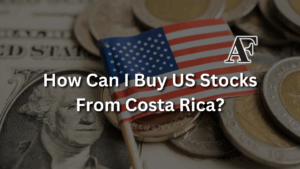Costa Rica residents can legally buy US stocks through various international brokerage platforms and foreign investment channels.
Foreigners are not restricted from investing in US securities, and several practical pathways exist for Costa Rican investors to access American equity markets.
International brokerage firms offer cost-effective solutions for Costa Ricans seeking US stock investments.
Nevertheless, certain aspects like tax obligations are to be taken into careful consideration.
In this guide, we will be discussing some of the important aspects of purchasing US stocks as a Costa Rican, such as:
- Can foreigners invest in the US stock market?
- How do you buy US stocks from Costa Rica
- Do foreigners have to pay tax on US stocks?
My contact details are hello@adamfayed.com and WhatsApp +44-7393-450-837 if you have any questions.
The information in this article is for general guidance only. It does not constitute financial, legal, or tax advice, and is not a recommendation or solicitation to invest. Some facts may have changed since the time of writing.

Are foreigners allowed to buy US stocks?
Yes, foreigners can absolutely invest in the US stock market. There are no citizenship or residency requirements for owning American stocks.
The US Securities and Exchange Commission (SEC) has consistently maintained that foreign nationals may participate in US capital markets on an equal footing with US citizens.
This highlights the fact that US securities regulations welcome international participation.
The Securities Exchange Act of 1934 and related legislation do not impose nationality restrictions on stock ownership.
This regulatory framework allows Costa Rican residents to invest directly in US equities without legal barriers related to their citizenship status.
Regulatory Compliance Requirements
Foreign investors must comply with standard identification procedures. US brokerage firms require comprehensive documentation from international clients, including government-issued photo identification, proof of address, and tax identification numbers.
Costa Rican investors typically need to provide:
- Valid passport or national identification
- Recent utility bills or bank statements for address verification
- A U.S. Taxpayer Identification Number (ITIN) only if required for tax filing purposes
- W-8BEN form to claim tax treaty benefits and reduce withholding rates on dividends
Account Types Available
- Standard individual brokerage accounts for most foreign investors
- Joint accounts may be available depending on tax status
- Corporate accounts for foreign entities with proper documentation
Paper applications are often required on par with online applications, and additional verification may be needed compared to US citizens.
Processing time is typically 1-3 days for account approval.
Can I have a US brokerage account if I live abroad?

Yes. Multiple international brokerage options serve Costa Rican residents.
Viable options include Interactive Brokers, XTB, Swissquote, and several CFD brokers that provide access to US equity markets.
Charles Schwab offers specialized expatriate services for US citizens living in Costa Rica.
Schwab Stock Plan Services specifically includes Costa Rica in its list of 52 jurisdictions eligible for fully featured international accounts. However, Schwab International primarily serves US expats rather than foreign nationals.
Trading 212 provides commission-free stock trading with access to over 13,000 stocks and ETFs, including US markets.
However, as of 2025, availability for Costa Rican residents is very limited and requires case-by-case verification.
How to invest in US stocks as a non-resident in Costa Rica?
Having access to the right brokerage is only the first step. Costa Rican investors can successfully build US stock portfolios by focusing on investment options, currency management, and long-term strategies.
Investment Options
- Individual Stocks – Trade major companies listed on the NYSE and NASDAQ.
- ETFs (Exchange-Traded Funds) – Diversified exposure to multiple sectors and markets.
- Dividend Stocks – Large-cap firms that provide regular income.
- US Treasuries – Low-risk, dollar-denominated bonds backed by the US government.
Currency and Risk Management
- Holding assets in US dollars can protect against depreciation of the Costa Rican colón.
- Returns may fluctuate when converting profits back to CRC.
- Currency-hedged ETFs are an option for those looking to reduce FX risk.
Practical Considerations
- Choose a broker that accepts Costa Rican clients and supports USD accounts.
- Start with broad market ETFs, then diversify into stocks and bonds.
- Spread holdings across different industries and company sizes.
- Watch out for fees like wire transfers, trading commissions, and account maintenance.
Tax Implications
- US dividends are usually subject to withholding taxes.
- Investors must comply with Costa Rican reporting rules for foreign assets.
- A cross-border tax advisor can help minimize after-tax costs.
Long-Term Strategy
- Apply dollar-cost averaging by investing regularly.
- Reinvest dividends to maximize compounding.
- Review annually to rebalance portfolios and adjust goals.
- Stay informed about US market and tax policy changes.
Investing in US Stocks from Costa Rica via Brokerages
Many international brokers accept clients in Costa Rica, giving access to US and global markets. Which brokers are available depends on their legal entity and local rules, so always confirm on the broker’s official country page.
How to Buy US Stocks from Costa Rica
- Choose a broker
- Confirm they accept Costa Rican residents.
- Decide whether you want direct stock ownership (cash equities) or CFDs.
- Compare fees, product availability, and platform support.
- Open your account
- Complete the online application.
- Provide photo ID, proof of address, and possibly a tax ID.
- Some brokers may ask about your trading experience and income under KYC rules.
- Fund your account
- Use bank transfers (1–5 days), debit/credit cards (instant), or e-wallets like PayPal and Skrill, if available.
- Check withdrawal times, which can take a few days depending on the method.
- Find and trade stocks
- Use the broker’s search tool to locate a stock or ETF.
- Select how many shares and your order type — market, limit, stop, etc.
- Review research tools or analyst reports before trading.
Fees & Non-Trading Costs
- Trading fees: per-share, flat commission, or zero-commission models (sometimes offset by spreads).
- Other fees: inactivity, withdrawal, FX conversion, and data subscriptions.
What do you need to buy US stocks? Practical Checklist
- Confirm broker acceptance for Costa Rica.
- Verify whether you’ll own real shares or CFDs.
- Compare deposit/withdrawal options and times for Costa Rica.
- Review all fees carefully.
- Prepare documents (ID + proof of address) before applying.
- Test demo accounts and start small to confirm funding and withdrawal times.
Do foreigners pay tax on US stocks?
Yes. The United States imposes a 30% withholding tax on dividends paid to foreign investors in US stocks, unless reduced by a tax treaty.
This tax is applied at source and generally cannot be avoided without filing the correct documentation, such as IRS Form W-8BEN.
For investors based in Costa Rica, the country follows a territorial taxation system. This means foreign-source income — including US dividends and capital gains — is exempt from local tax for individuals.
Recent reforms added reporting obligations for certain passive foreign income, but the core principle of territorial taxation remains in effect as of 2025.
Corporate entities or those without sufficient economic substance in Costa Rica may face additional compliance requirements, though not a direct tax on US investment income.
Costa Rica also participates in FATCA reporting, but only US taxpayers are reportable under that framework.
Conclusion
Costa Rican residents have clear pathways to invest in US stocks through established international brokerage platforms.
The process is straightforward, as no citizenship restrictions exist under US securities law, and multiple account options serve foreign investors with proper documentation.
Key considerations include choosing the right broker, preparing required documents like W-8BEN forms, and understanding tax implications in both jurisdictions.
Success requires careful planning around currency exposure, tax obligations, and broker selection.
While Costa Rica’s territorial taxation generally exempts foreign income, FATCA agreements mean investors must comply with reporting requirements.
US withholding taxes on dividends can be reduced from 30% to 15% with proper documentation, making dividend-paying stocks and ETFs attractive options.
For long-term success, Costa Rican investors could start with diversified ETFs before moving to individual stocks, maintain proper documentation for tax purposes, and work with qualified professionals in both countries.
The combination of US market access and Costa Rica’s investor-friendly policies creates excellent opportunities for building international investment portfolios while managing cross-border compliance effectively.
FAQs
What are the investment options in Costa Rica?
Costa Rica offers real estate investments in coastal properties and vacation rentals, particularly in areas like Tamarindo and Manuel Antonio.
Foreign direct investment through the Free Trade Zone program provides tax exemptions for manufacturing and service companies.
The minimum investment is $150,000 for companies within the Greater Metropolitan Area (GMA) and $100,000 for companies outside it.
This might vary based on specific conditions and locations.
Tourism and hospitality sectors present opportunities in eco-tourism, hotels, and sustainable development projects.
Government bonds and local banking products are also available for conservative investors.
What is the safest investment in the US for Costa Ricans?
US Treasury securities provide maximum safety with government backing, eliminating credit risk while offering US dollar exposure.
Large-cap dividend stocks from established S&P 500 companies offer stability with income generation.
Blue-chip stocks in sectors like consumer staples and healthcare represent relatively safe long-term investments.
Which investment has the highest return in the US?
Growth stocks in the technology and healthcare sectors historically generate the highest returns, particularly companies involved in artificial intelligence, cloud computing, and biotechnology.
Sector-specific ETFs focused on emerging technologies, renewable energy, or healthcare innovation offer high growth potential.
However, these high-return investments carry corresponding higher risks, unsuitable for conservative investors.
Which countries own the most US equities?
Foreign ownership of US stocks reached $17.3 trillion in 2025, representing around 27.5% of total US market capitalization.
Canada, Japan, and the United Kingdom lead foreign investment in US equities due to strong financial ties and sophisticated investment infrastructure.
These developed nations represent the largest foreign investor base in American equity markets.
Emerging market participation continues to grow, with Latin American countries like Brazil and Mexico showing increasing interest.
Is America the best country to invest in?
The US maintains the world’s largest and most liquid equity market, providing unmatched investment variety and growth opportunities.
American companies lead global innovation in technology, healthcare, and emerging industries, offering access to world-leading firms in AI, biotechnology, and renewable energy.
The SEC’s regulatory framework and strong legal protections provide security for foreign capital that may be lacking in other jurisdictions.
However, currency risk and tax implications should be considered for foreign investors.
How to make money in Costa Rica as a foreigner?
Real estate investment dominates foreign investment opportunities, with coastal properties offering vacation rental income and capital appreciation potential.
The Free Trade Zone program attracts international business investment with significant tax exemptions for companies meeting the $150,000 minimum investment threshold.
Tourism and hospitality sectors provide entrepreneurial opportunities in eco-tourism, hotels, and related services due to Costa Rica’s stable tourism industry.
Agricultural investments and sustainable development projects also offer potential returns.
Is it smart to buy land in Costa Rica?
Costa Rican real estate offers advantages, including low property tax rates of 0.25% of registered value, a stable government, and a growing tourism sector.
The constitution guarantees equal property rights for foreigners, providing security not available in many Latin American countries.
Market appreciation potential exists in strategic locations, particularly coastal areas and locations near San José.
However, thorough due diligence and working with local experts are essential to navigate legal requirements and identify optimal opportunities.
Pained by financial indecision?

Adam is an internationally recognised author on financial matters with over 830million answer views on Quora, a widely sold book on Amazon, and a contributor on Forbes.



